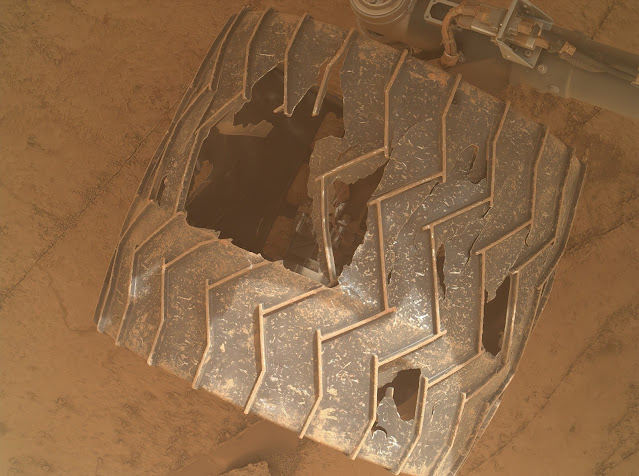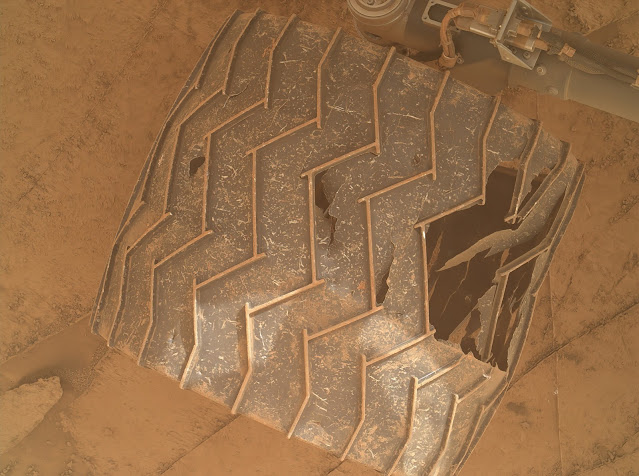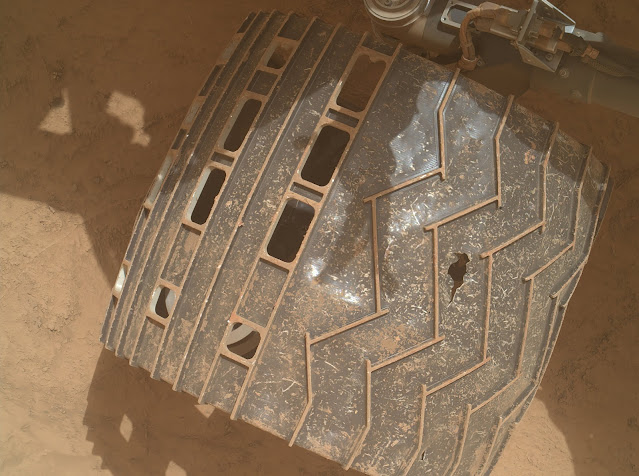NASA's Mars Curiosity Rover—New Closeup Image & Wheel Damage Inspection
"It's not the years . . . It's the mileage."
A routine check of the aluminum wheels on NASA's Mars Curiosity rover has found additional breaks on the wheels—the latest signs of wear and tear as the rover continues its journey, now exceeding 17 miles or 28 kilometers since its landing in August 2012.
The Curiosity rover is climbing to sequentially higher and younger layers of lower Mount Sharp to investigate how the region's ancient climate changed billions of years ago. Clues about environmental conditions are recorded in the rock layers. During its first year on Mars, the mission succeeded at its main goal by finding that the region once offered environmental conditions favorable for microbial life, if Mars has ever hosted life. The conditions in long-lived ancient freshwater Martian lake environments included all of the key chemical elements needed for life as we know it, plus a chemical source of energy that is used by many microbes on Earth.
MSL - Sol 948 - MAHLI
Image Credit: NASA/JPL-Caltech/MSSS/Kevin M. Gill
MSL - MAHLI - SOL 3492 - Image A
MSL - MAHLI - SOL 3492 - Image I
MSL - MAHLI - SOL 3492 - Image B
MSL - MAHLI - SOL 3492 - Image D
"We’re up close to a nifty layered outcrop, which is getting lots of imaging including ChemCam LIBS on targets ‘Rukumata’ and ‘Guarico,' a ChemCam mosaic on ‘Kamakusa,’ MAHLI dogs-eye imaging of ‘Tabaco’ and the DRT location ‘Issano,’ which will also have APXS on it. Mastcam will also be imaging Issano pre- and post-DRT for comparison, and taking a mosaic of the outcrop as a whole. Off the outcrop, ChemCam is also doing LIBS on ‘Sisipelin,’ which Mastcam will also image, and ChemCam and Mastcam are both taking mosaics further afield towards the Gediz Vallis Ridge."
"Imaging the crater rim can help us to characterize the amount of dust in the atmosphere, which is especially important in the dusty season. Aside from the crater rim observations, we are also trying to catch dust devils with a dust devil survey and movie, keeping an eye on the clouds with a few cloud movies, and taking Mastcam tau observations as an additional way to quantify the amount of dust in the atmosphere."
"After this marathon of observations, we’ll drive about 30 m further and finish up the weekend with a morning ENV block with our weekly AM cloud and dust observations."
Caption Credit: Alex Innanen
Release Date: June 4, 2022
Mission Name: Mars Science Laboratory (MSL)
Rover Name: Curiosity
Main Job: To determine if Mars was ever habitable to microbial life.
Launch: November 6, 2011
Landing: August 5, 2012, Gale Crater, Mars
For more information on NASA's Mars missions, visit mars.nasa.gov
Wheel Image Credits: NASA / JPL-Caltech / MSSS / PipploIMP
Image Release Dates: June 3-9, 2022
#NASA #Space #Astronomy #Science #Mars #RedPlanet #Planet #Astrobiology #Geology #Crater #MountSharp #GaleCrater #Curiosity #Rover #Robotics #Wheels #WheelDamage #Technology #Engineering #JPL #Pasadena #California #UnitedStates #JourneyToMars #CitizenScience #STEM #Education
.jpg)







No comments:
Post a Comment